Colorado Medical Society
http://dev.cms.org/articles/cpmg-medical-student-sections-and-copic-sponsor-successful-policy-forum/CPMG Section, Medical Student Component and COPIC sponsor successful policy forum
Wednesday, February 07, 2018 01:12 PM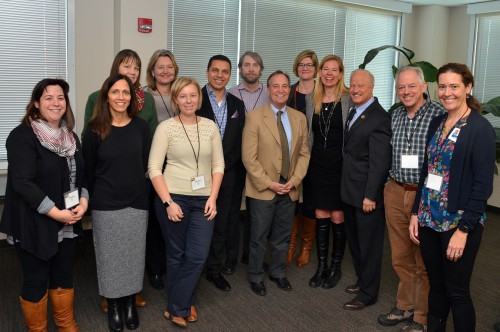
Photo, right: CPMG physicians meet Congressman Perlmutter and Congressman Coffman.
The Colorado Medical Society CPMG Section joined COPIC and the CMS Medical Student Component to sponsor the 2018 Public Policy Leadership Forum on Feb. 3, which brought together an all-star lineup of speakers -- including two members of Congress and two state legislators -- to give physician attendees real-world tips and tricks for successfully advocating for patients and physicians within the public policy and regulatory spaces.
"This concept has been a year in the making and we're excited that you're here," said CPMG Section Chair Kim Warner, MD, in her opening address to the audience. "What are we ultimately talking about in terms of health care advocacy? Quality improvement. At the end of the day I want you to believe you can make a difference in health care public policy on behalf of our profession and patients, and have your voice heard and to lead others in this endeavor. You already have the skills available; if you're willing to invest your time, we're going to be even stronger for our patients and the physicians we serve."
The first panel of the day took attendees through the evolution of public health legislation resulting from the opioid crisis. State Representative Brittany Pettersen shared her emotional testimony for getting involved in the effort to find policy solutions to aid groups in addressing the opioid epidemic, and state Senator Jack Tate gave an overview of two bills he's sponsoring in the 2018 legislature on the topic.
The next panel featured Congressman Mike Coffman (R-Aurora, 6th Congressional District) and Congressman Ed Perlmutter (D-Jefferson County, 7th Congressional District). They both stressed the importance of developing and fostering a relationship with elected officials. Above all, be honest and trustworthy.
A working lunch brought CMS pollster Benjamin Kupersmit to the podium to talk about how his firm develops and conducts polls for the society, and how the data can be used to support advocacy work.
Jandel Allen-Davis, MD, vice president of Government, External Relations and Research at Kaiser Permanente Colorado, wrapped up the lunch out with her "top 10 lessons from a political novice who spent most years caring for patients." Among her top lessons was to be a good listener, be open to diverse perspectives, and approach lobbying with humility and an open mind. "Political capital is earned, spent and lost in the manner in which you conduct yourself," she said. "Under that dome, all you have is your reputation. You lose it and it’s gone forever."
"Physicians are perfectly positioned as advisor and advocate and that’s from the skills we learn at the most vulnerable times in people’s lives and how we hold those relationships so dearly," Allen-Davis said. "Keep your heart and ears open. Prioritize, triage, cut through the chaff and make good decisions; that's what the best of those who do government relations work do. Advocacy can be learned and requires study. Politics are a team sport. With health care issues, physicians have a unique role to play."
Resources:
Download the complete packet of handouts here.
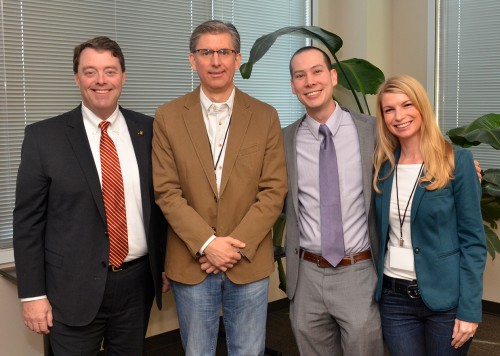
From the distinguished opioid panel, Sen. Jack Tate; Don Stader, MD, CMS liaison, Opioid and Other Substance Use Disorders Interim Study Committee; Robert Valuck, PhD, RPh, FNAP, chair, governor’s Consortium for Prescription Drug Abuse Prevention; and Rep. Brittany Pettersen.
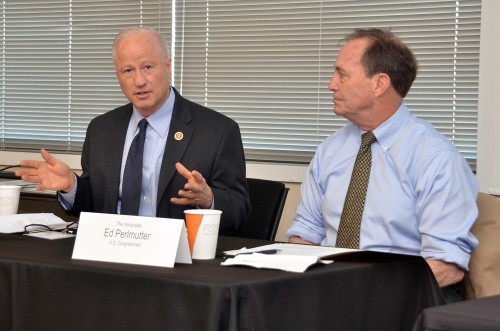
From left: Congressman Coffman and Congressman Perlmutter address the audience.
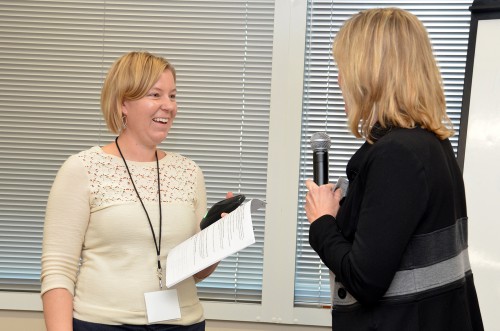
Shannon Jantz, MD, left, participates in a mock legislative visit as a friendly legislator.
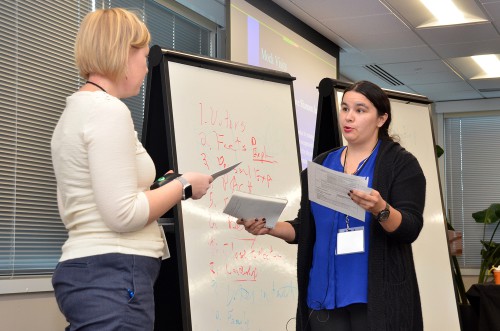
Medical student Sara Graves, right, practices her new advocacy skills in a mock legislative visit.